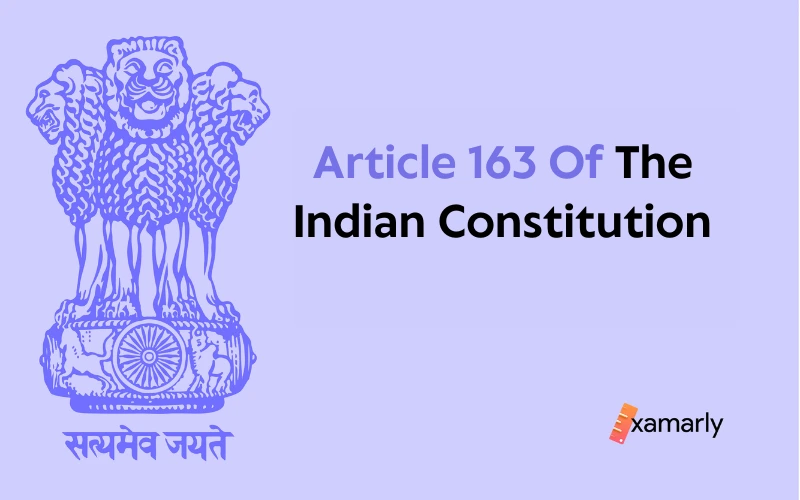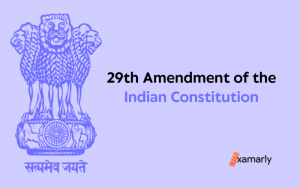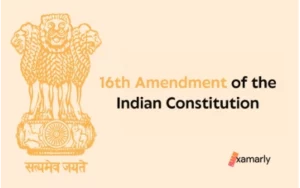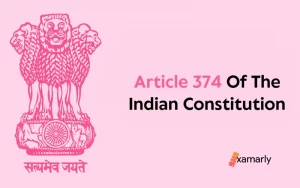In accordance with the provisions of Article 163 of the Indian Constitution, there must be a council of ministers, with the Chief Minister serving as its head, in order to provide assistance and advice to the Governor in the performance of his responsibilities (with a few exceptions in certain cases).
In accordance with the British model, the Constitution of India calls for a parliamentarian or cabinet-style system of administration.
Under the Cabinet form of government, the Governor is the official or constitutional head of state and, with the help and counsel of his Council of Ministers, he executes all of the duties and powers granted to him by or under the Constitution.
This article devotes a significant amount of space to the topic “Article 163 – Council of Ministers to help and advise Governor,” which is an essential component of the UPSC/IAS Exam Polity curriculum and is covered in length here.
- Article 163 Of The Indian Constitution
- Council Of Ministers
- Relation Between The Governor And The CoM
- Source Of Article 163 Of The Indian Constitution
- Analysis And Issue With Article 163
- Conclusion
- FAQs
- What Article 163 Of The Constitution Of India Stipulates?
- What Is The Council Of Ministers?
- Who Appoints The Chief Minister And Under Which Article Of The Constitution?
- Who Holds The Real Power: The Chief Minister Or The Governor?
- Which Article Articulates That The CoM Advices The Governor?
- Who Is Responsible For Choosing A State's Council Of Ministers?
- Which Article Addresses The President Of India?
- Who Makes Appointments For The Position Of Governor?
- Which Part Of The Indian Constitution Deals With Article 163?
Article 163 Of The Indian Constitution
The Constitutional Provisions Article 163 are as follows:
- To assist and advise the Governor as he performs his functions, there must be a Council of Ministers with the Chief Minister at its helm, with the exception of those instances in which he is compelled to perform all or all of his responsibilities at his discretion by or under this Constitution.
- In the event that there is any uncertainty regarding whether or not a particular matter is one in which the Governor is obligated to act in his discretion in accordance with this Constitution, the decision that the Governor makes in accordance with his discretion shall be considered final. Furthermore, nothing the governor does can be questioned on the grounds that he should or shouldn’t have used his discretion.
- It is not permissible for any court to investigate the matter of whether or not any advice was given by ministers to the governor and, if it was, what kind of advice it was.
Council Of Ministers
- In various nations, the term “Council of Ministers” refers to the chief executive body of the government.
- In a state’s political-administrative structure, which is headed by the chief minister, the Council of Ministers serves as the real executive authority.
- The councils of ministers in each state are organized and carry out their duties in a manner that is analogous to that of the Council of Ministers at the central government.
- Article 163 discusses the position of the council of ministers in the government.
- The appointment of ministers, their terms in office, their responsibilities, their credentials, their oaths, as well as their salaries and allowances, are all covered in Article 164 of the Constitution.
Relation Between The Governor And The CoM
The two have a similar relationship to that between the president and his ministers (Article 74 of the Indian Constitution). The main distinction is that, according to the Constitution, the President lacks the authority to decide certain issues on his own. According to Article 163, only the governor is granted this authority. If the governor is put in a position where he must make a discretionary decision, he is not required to consult with his cabinet.
The following are some of the areas in which a governor has latitude to apply his or her discretion:
- When a governor is appointed by the President to administer both a state and a union territory, as per Article 239 (2), the governor is given full authority to carry out his duties as administrator without interference from anybody else.
- In addition, each state’s governor is given a particular obligation by the Constitution, which must be carried out at his or her own discretion, but he or she may consult with the council of ministers. In this kind of circumstance, he is obligated to take into account the instructions or directions that have been provided by the President. For instance:
- According to Article 371(2), the President has the authority to issue directives to the governors of the states of Maharashtra and Gujarat, requesting that they adopt measures to promote the growth of specific regions within their respective states.
Source Of Article 163 Of The Indian Constitution
It should be remembered that the Government of India Act, of 1935, is the primary source of the Indian Constitution.
The majority of its provisions are already directly integrated into the Constitution.
In a similar vein, Article 163 was adapted from Section 50 of the Act, which mandates that the council of ministers must assist and advise the governor on all significant issues, with the exception of those pertaining to the duties that require him to use his discretion.
Check out the linked article to learn about Article 157 of the Indian Constitution (Qualifications for appointment as Governor).
Analysis And Issue With Article 163
A number of the broad authorities granted to the governor by the Act of 1935 no longer exist in the current Constitution.
While he formerly had the authority to elect other ministers to the council of ministers at his discretion, he is now required by Article 164(1) to consult the Chief Minister before doing so.
According to a straightforward interpretation of Article 154 of the Constitution, all of the executive power or actions in a state are to be carried out in the name of the Governor, and the power to do so is vested in him. But unfortunately, this is not the case.
He just serves as the symbolic head and constitutional head. The real power dwells with the council of ministers, in the same way as it does with the President.
A governor may only serve in that capacity at the President’s pleasure, according to Article 156 of the Constitution of India.
In accordance with Article 163, he is required to communicate with and seek advice from the council of ministers on all issues unless there is a specific circumstance in which he is allowed to use his discretionary power, which is only allowed in rare circumstances.
The governor may exercise discretion in situations when the council of ministers’ advice runs counter to constitutional principles or involves bias or a conflict of interest, but in all other cases, he must heed their recommendations. Even in situations in which the Constitution is silent about whether or not he should act on the advice of ministers, he is required to consult with them.
For instance, in the case of Maru Ram v. Union of India (1980), the Honorable Supreme Court was evaluating the powers of the governor and came to the conclusion that the ability to give pardons could only be exercised after consulting the council of ministers.
In a similar manner, the Supreme Court ruled in the case of Satpal v. State of Haryana (2000) that in order for the governor to properly execute the authority granted to him by Article 161, he must first confer with the council of ministers.
Another concern or underlying problem with Article 163 was who would decide the scope and degree of discretion that the governor might exercise and if the discretion was used, who would decide whether the action is taken or authority used was ultra vires to the Constitution or not.
In response, the Supreme Court ruled in Nabam Rebia and Bamang Felix v. Dy. Speaker, Arunachal Pradesh Legislative Assembly (2016) that a governor’s decision-making would be susceptible to judicial review if it went outside the scope of his or her authority.
The Supreme Court stated that the Judiciary will evaluate the power of discretion if it is used outside of its bounds, although the constitutionality of the governor’s discretionary power is still in dispute.
Why should the governor have this authority if the President, who serves as the country’s executive head, is not given it, not even in extraordinary circumstances?
In order to decide whether or not Article 163 is constitutional and whether or not the governor has the authority to use his discretion, this question must be examined.
Conclusion
According to Article 163, a state’s governor is entitled to the advice and counsel of a council of ministers on all subjects of significance to the state. However, the governor does have certain discretionary power that he must use in specific situations. Despite the fact that there have been significant flaws and challenges with this Article, particularly the governor’s discretionary power as stated above. While addressing these issues in various cases, the courts have clarified the Article’s position and the governor’s authority.
FAQs
What Article 163 Of The Constitution Of India Stipulates?
The Governor will receive assistance and advice from a Council of Ministers, headed by the Chief Minister, in the performance of his duties, with the exception of any instances in which the Governor is required by or required to exercise any of his functions at his discretion in accordance with this Constitution.
What Is The Council Of Ministers?
The actual executive function or authority in a state’s political-administrative structure is the council of ministers, which is presided over by the chief minister. The council of ministers in each of the states is organized and performs its duties in a manner that is identical to that of the council of ministers in the central government. The Constitution does not go into great length regarding the principles that underlie the parliamentary form of government; rather, Articles 163 and 164 touch on those principles in a way that is broad, vague, and general.
Who Appoints The Chief Minister And Under Which Article Of The Constitution?
In accordance with Article 164 of the Constitution, the Governor is the person responsible for making appointments to the positions of Chief Minister and other Ministers.
Who Holds The Real Power: The Chief Minister Or The Governor?
The governor has the position of the formal head of state, while the Chief Minister is the one who holds the real power.
Which Article Articulates That The CoM Advices The Governor?
With a few notable exemptions in particular circumstances, the provisions of Article 163 of the Indian Constitution stipulate that there must be a council of ministers, with the Chief Minister serving as the head of the council, in order to offer help and advise to the Governor in the discharge of his obligations.
Who Is Responsible For Choosing A State’s Council Of Ministers?
The Governor of a state is the person who is responsible for making appointments to the Council of Ministers in a state. The Governor also makes appointments to other ministerial positions based on the advice of the Chief Minister. The Council of Ministers is the organization to which the State’s legislative body is jointly accountable.
Which Article Addresses The President Of India?
The President of India is outlined in Article 53 of the Indian Constitution.
Who Makes Appointments For The Position Of Governor?
In India, the President appoints the governor of each state. A governor is a person who serves in office at his or her own leisure.
Which Part Of The Indian Constitution Deals With Article 163?
The States, which make up the other half of Indian federalism, are covered in PART VI of the Constitution. Articles 163-164 deal with the Council of Ministers (CoM) in each state.






